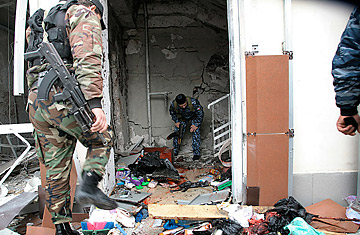
Special Force officer are seen inspecting a scene of a bomb blast in front of the Chechen parliament Oct. 19th, 2010. At least two police officers and one parliamentary official were killed in the attack, authorities said.
Right after three suicide commandos raided the parliament of Chechnya on Tuesday, the president of the republic, Ramzan Kadyrov, arrived to survey the building's courtyard, which was splattered with the blood and limbs of the attackers and their victims. Then he went to change his outfit. About an hour later, he returned in full military regalia — an off-white uniform with gleaming epaulettes — to deliver a speech to the parliament that had a Potemkin-village like disjunction with the immediacy of danger. "Please excuse today's situation," he told the legislators. "We will try to prevent such moments from taking place."
But the situation now facing Russia's most troublesome region is not one that can be hidden behind a show of denial or bravado. For the first time in years, the old breed of Chechen terrorists — despite suffering a dramatic change in leadership — looks to have re-emerged, and their main target is the Kadyrov regime, which Moscow has long depended on to keep Russia's southern flank under control.
The first evidence of the turnabout emerged on August 29, when an unprecedented attack took place in Kadyrov's home village of Tsentoroi, leaving 19 people dead, including a dozen suspected insurgents. There was of course nothing new about a terrorist attack in Russia's mountainous North Caucasus. Suicide bombings, assassinations and ambushes against police take place on an almost weekly basis in this region, which militants are fighting to turn into an Islamist state governed by Shari'a law. But this was the first time in recent memory that the insurgents had used the kinds of tactics deployed in Mumbai in 2008: a group of highly skilled and heavily armed commandos killed as many people as possible before being "martyred" themselves. It was also the first time Kadyrov's beloved village has been so brazenly defaced. Predictably, the Russian and Chechen authorities dismissed it as a one-off event.
But then came the attack on the parliament in the Chechen capital, Grozny. Just after 9 a.m. on Tuesday, as the deputies were preparing to start their session, a gunman blew himself up at the entrance in order to clear a path through security, allowing two others to run into the building and engage the police in a shootout before setting off their own suicide bombs. According to police, at least six people died, including the three attackers, and 17 others were wounded. (No legislators were killed.)
"The attack in Tsentoroi, which is holy ground for Kadyrov, was simply an aberration, a shock," says Pavel Baev, an expert on the North Caucasus at the International Peace Research Institute in Oslo. "But a second attack of this kind in the heart of the capital now points to a trend. It shows that a new force is emerging in Chechnya."
Although no one has claimed responsibility for either attack, Kadyrov and police officials in Moscow have blamed it on a Chechen separatist named Hussein Gakayev, who has long been a fairly obscure figure in the rebel underground. His star began to rise this summer, when his commander, Doku Umarov, the leader of the North Caucasus insurgency, made a series of embarrassing mistakes. On August 1, Umarov released a video on a rebel website announcing his resignation, but then revoked it in another video three days later, proclaiming that he would stay on as the so-called Emir of the Caucasus. This followed a blunder that came after the twin suicide bombings that killed at least 40 people in the Moscow subway in March. Umarov first released a statement blaming that attack on the Russian secret police, but followed up with a video claiming responsibility for himself.
"This waffling made him look weak and indecisive," says Yuliya Latynina, an expert on the Caucasus and a prominent political commentator in Moscow. "It led to confusion and dissent within the ranks." The Chechen wing of the North Caucasus insurgency, which also includes fighters in the regions of Dagestan, Ingushetia and several others, had already been unhappy with Umarov's leadership. His goal of splitting off the entire Caucasus would have made Chechnya just one province in a new Islamic state, Latynina says, and that did not sit well with the nationalist Chechen fighters who wanted independence for themselves.
So in a video posted on a rebel website on Oct. 7, the main rebel commanders in Chechnya renounced their allegiance to Umarov, blaming him for failing to consider the interests of his lieutenants. They then proclaimed Gakayev the new Emir of Chechnya. "For years Gakayev has been camped out in the forests of central and south Chechnya," says Alexander Cherkasov, a Chechnya expert and board member of Russia's leading human rights group, Memorial. "But the fact they pulled off these two strikes shows that they are getting not only financial support but new volunteers. More than a dozen suicide attackers is a lot for any organization to spend on two operations," Cherkasov says.
Observers now say that Gakayev is in a position to recruit the young Chechens who have long opposed Kadryrov's autocratic rule, but who never had much sympathy for a pan-Caucasian emirate. "This creates the potential for a new kind of insurgency that is directly against Kadyrov, against his authority and control over Chechnya," says Baev.
So far Kadyrov has dismissed this threat, as have his backers in Moscow. Russia's Interior Minister, Rashid Nurgaliev, whose visit to Grozny coincided with Tuesday's attack on the parliament, struggled to stay calm as he addressed the chamber afterward. "Here, there is security and stability," he proclaimed, a statement that could hardly seem convincing when clean-up crews were at that very moment wiping blood from the walls of parliament's courtyard.
